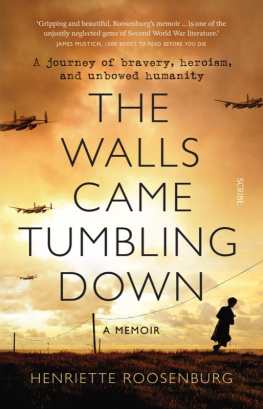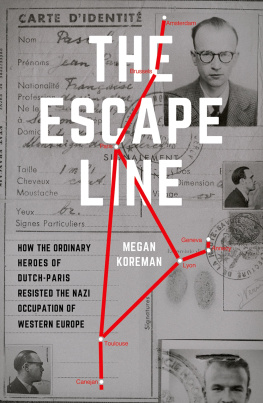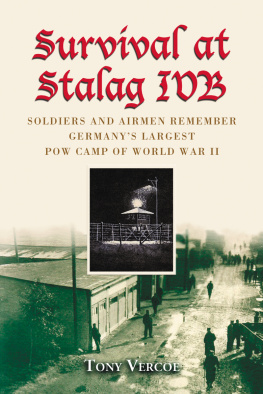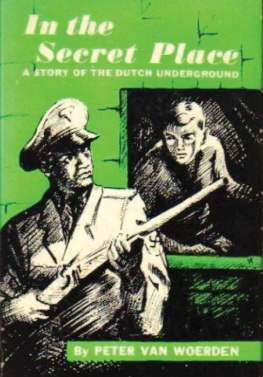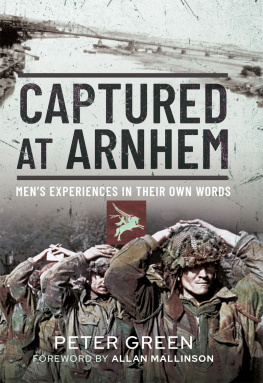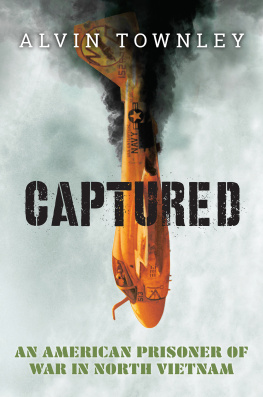
THE WALLS CAME TUMBLING DOWN
Henriette Roosenburg (19161972) was part of the Dutch Resistance during World War II. She collected news for the underground press, accompanied people across the border, and helped maintain an escape route for crashed Allied pilots. After the war, she emigrated to the United States, and started to work for Life Magazine . She wrote the first draft of what would later become The Walls Came Tumbling Down for The New Yorker .
Scribe Publications
2 John St, Clerkenwell, London, WC1N 2ES, United Kingdom
1820 Edward St, Brunswick, Victoria 3056, Australia
3754 Pleasant Ave, Suite 100, Minneapolis, Minnesota 55409, USA
First published by Viking Press 1957
Published in this edition by Scribe in North America 2020
Published in this edition by Scribe in the United Kingdom, Australia and New Zealand 2021
Text copyright Henriette Roosenburg and Cossee Publishing House, Amsterdam, 1957, 2020
Afterword copyright Sonja van t Hof 2020
Translation of Afterword copyright Laura Vroomen 2020
All rights reserved. Without limiting the rights under copyright reserved above, no part of this publication may be reproduced, stored in or introduced into a retrieval system, or transmitted, in any form or by any means (electronic, mechanical, photocopying, recording or otherwise) without the prior written permission of the publishers of this book.
The moral rights of the author have been asserted.
9781913348250 (UK edition)
9781950354337 (US edition)
9781922310156 (Australian edition)
9781925938326 (ebook)
Catalogue records for this book are available from the National Library of Australia and the British Library.
scribepublications.co.uk
scribepublications.com
scribepublications.com.au
To my friends Joke, Nell, Dries, and Jos,
and to all those who died
so that Holland might live.
CONTENTS
Introduction
THIS IS A story of the liberation of four Dutch political prisoners at the end of World War II, and about their trek home to Holland after Russian soldiers had freed them from the prison in Waldheim, a small village in south-eastern Germany.
THE FOUR PEOPLE are:
Nell, thirty years old. She was an official in the Netherlands scout movement whose organisational talents were extremely useful in the Resistance. Until she was caught by the Gestapo in the autumn of 1943, she managed a network of hiding-places for Allied pilots who were shot down over Holland. She also had a hand in organising the Dutch end of an escape line running through Belgium and France to Spain and Portugal, with the purpose of getting these airmen back into action, where they would do the most good.
Joke (pronounced Yokuh ), twenty years old. Barely out of high school, Joke threw herself wholeheartedly into working with a local Resistance group, which concentrated on picking up shot-down Allied pilots in the moors around her village and finding hiding-places for them. She quickly graduated to a national movement and thus came to know Nell and other people on the escape lines. She personally escorted several Allied airmen over the Dutch-Belgian border. Joke was caught in May 1944 and condemned to death.
Zip, twenty-eight years old, the narrator of this story. As a student of Dutch and French literature at the University of Leiden, she began working in the underground press in the early days of the war, and eventually became a courier to Belgium, France, and Switzerland for a Resistance group that transmitted intelligence about German troop movements and other matter to the Dutch government in London. As a courier, she inevitably became entangled with some of the escape lines and occasionally helped Allied pilots when they happened to get stuck. In that way, she got to know both Nell and Joke. She was caught in March 1944 and condemned to death.
Dries, the lone man in the party, twenty-six years old. A merchant seaman, Dries happened to be on leave in Holland when the war broke out. In the spring of 1944 he tried, with three friends, to cross the English Channel, leaving from a Dutch beach. Foolhardy as the attempt was (for the Germans guarded the coast so well that it was impossible to launch a well-supplied and seaworthy craft) they were almost halfway before they found themselves surrounded by German warships and were ignominiously hauled back. Dries was thus caught in April 1944 and condemned to death.
THE NAZIS TREATED their political prisoners in various and hardly rational ways. Many prisoners were shot without trial. Many more were allowed to die from starvation, dysentery, tuberculosis, and other illnesses that were rampant in the concentration camps and prisons. Some, like the four in this story, were officially court-martialled, but their courts-martial were a parody of justice: the defence lawyer, appointed by the Nazis, wasnt allowed to see the prisoners before the sentencing. His only role was to be present while the sentence of death was pronounced a pathetic reminder of the fact that Germany used to belong to the civilised nations and knew what the judicial process was.
Even after an official court-martial, the treatment differed. Sometimes the condemned-to-death were taken out of the prison the next morning at dawn and shot at some convenient spot in the neighbourhood. Sometimes they were put in the so-called Nacht und Nebel (Night and Fog) group (called NN by both prisoners and guards) and shunted around from one prison to another, always farther away from the front lines. All four principals of this story belonged to the NN group.
Once inside the prisons or concentration camps, the NNs were the lowest category of prisoners. At the top were the German criminals, who got the coveted trusty jobs of distributing food and clothing (keeping the best of both for themselves) and working in the kitchens. Next came a medley of prostitutes, black marketeers, and petty criminals from all nations under German occupation. They were the assistants to the wardens, the runners of errands, the spies on the work details. The third category consisted of political prisoners, ranging from the unfortunate innocent who had been denounced for listening to the BBC to the active Resistance member who had been caught in an act of sabotage, of distributing an illegal newspaper, of sheltering Jews or members of his underground group, or any of the thousand other acts that were verboten by the Nazis. These were the people who made up the work details. Their work could be anything from cutting wood in swamps to doing precision work on time fuses, from packing garbage to digging graves; it depended on what the camp or prison itself needed and the proximity of factories that were short of labour. These politicals had no privileges, no extra food or clothing. Their only advantage was an unintended one: they moved around, mingled with German workers or slave labourers in the factories they were assigned to, or, if they toiled in workshops inside a prison, with the criminals and prostitutes who distributed the daily tasks. They would sometimes get a German newspaper and read the news between the lines. Their grapevine was excellent, and they usually lived, worked, and died in close-knit, loyal groups.
Next, and at the bottom of the pile, were the NNs. They were kept in cells, and when they were led out for half an hours exercise about twice a week special care was taken that no other prisoners should even see them. Some of the workshops had glass-topped doors facing the prison corridor. These were covered with black cloth whenever the NNs were led by to the exercise yard. Originally, NNs were kept in solitary confinement; it was only in the last year of the war, when German prisons were crowded beyond belief, that this rule was relaxed to the point where six NNs would be crowded into a one-person cell. The politicals, if they were insistent enough and made enough noise, could complain to the head of the prison about bad food, inadequate quarters, stealing by the trusties, etc.; they did not always get results, but their complaints did help to prevent worse conditions. The NNs were expressly told that they had no right of appeal to anybody, and therefore were subject to more stealing of food by trusties and bad treatment from guards than anybody else.
Next page
